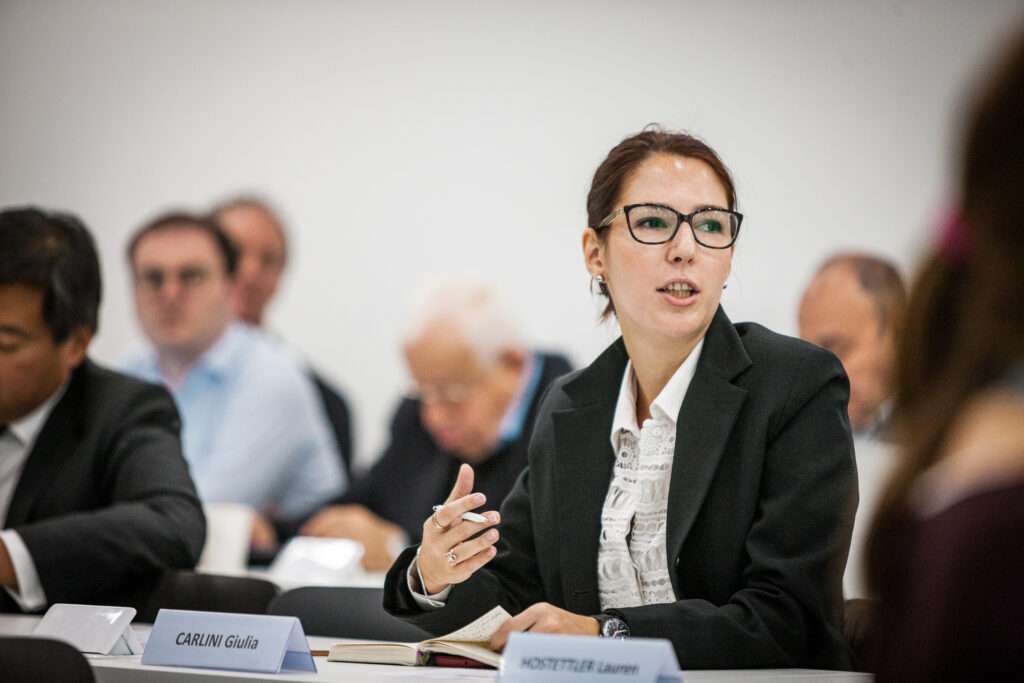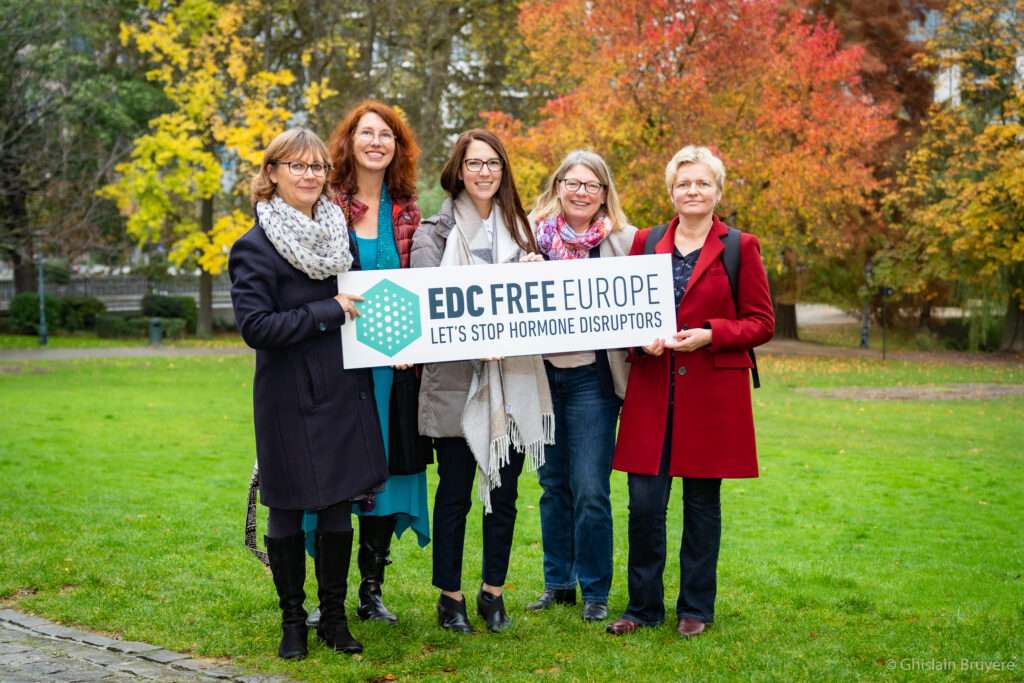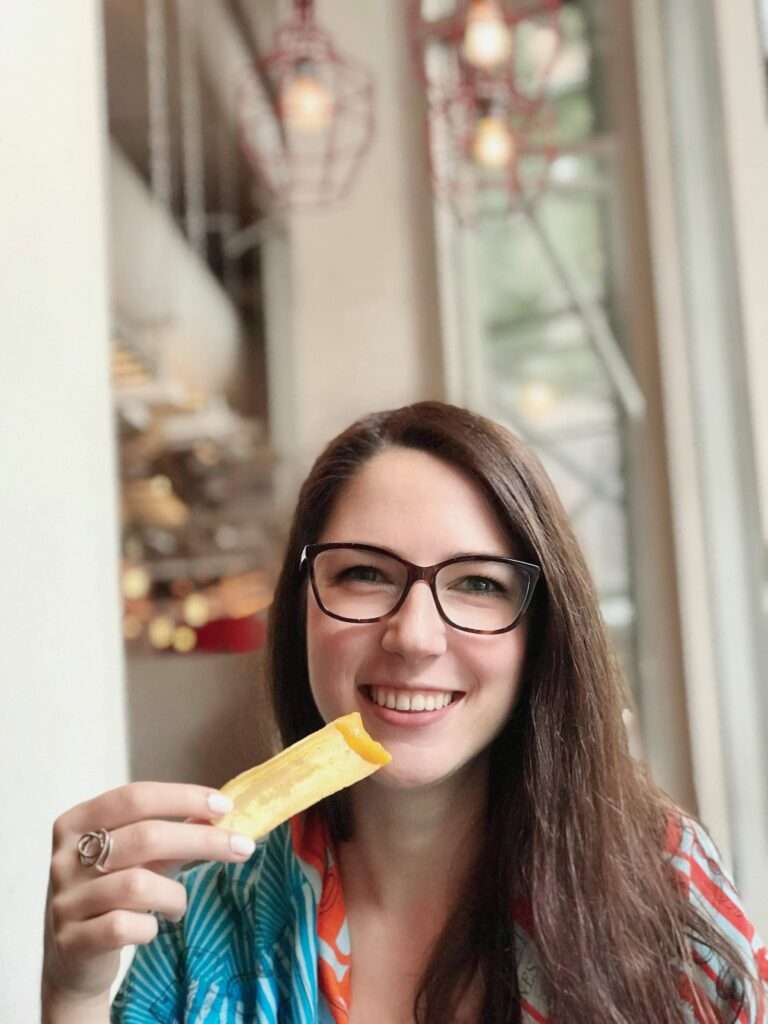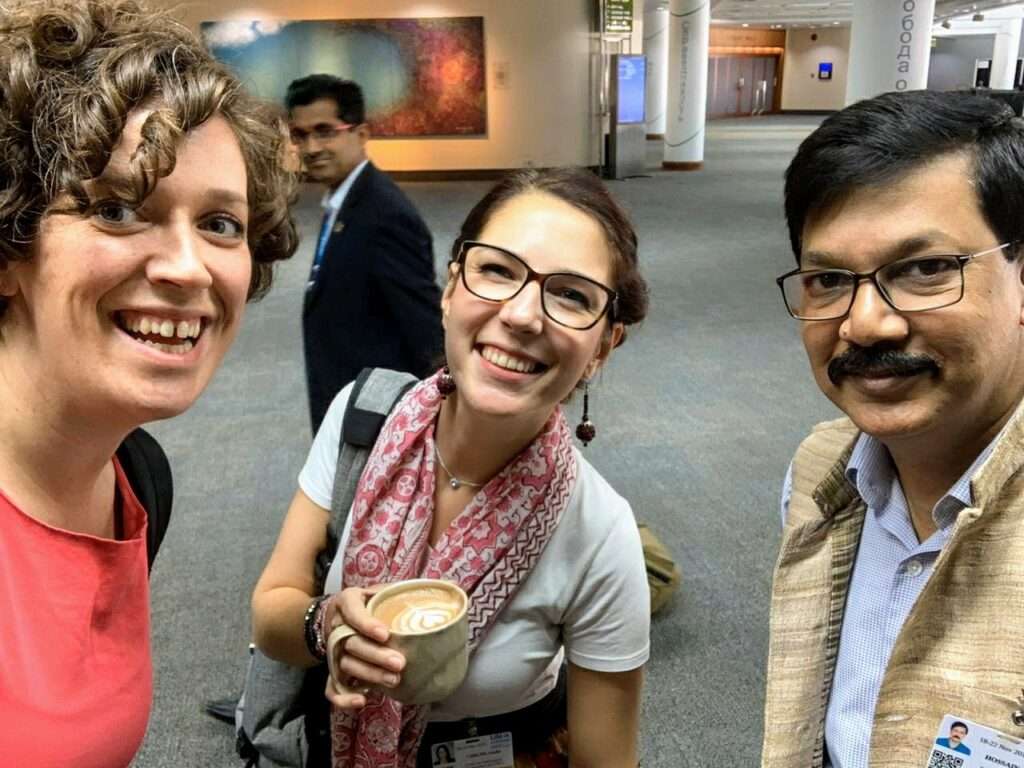
Here at the Center for International Environmental Law (CIEL), we know our strength comes from the people who make up our movement — from our staff, to our partners, to our steadfast supporters. Our “Meet Our Staff” series will introduce you to some of our amazing staff members, who work behind the scenes every day to defend the right to a healthy environment.
Giulia Carlini is an attorney with CIEL’s Environmental Health program, based in Geneva, Switzerland. She’s been with CIEL in her current position since 2016, before which she served as a legal intern for ten months. She earned a Masters in European and Transnational Law from Università degli Studi di Trento, Italy, and an LLM in International Law from the Graduate Institute of International and Development Studies of Geneva, Switzerland. We talked with Giulia about what she does here at CIEL, what excites her about the future, who she is as a person, and more.
Tell me about the work you do as a Staff Attorney at CIEL.
Giulia: I work with CIEL’s Environmental Health team. Since I joined, I’ve focused primarily on regulating endocrine disrupting chemicals (EDCs) in the European Union. EDCs are chemicals found in many everyday products — like food packaging, cosmetics, pesticides, etc. — that mimic the hormones in our bodies and have been linked to serious health effects such as reproductive, fertility, and neurological issues, diabetes, obesity, and even some cancers. The EU has been increasingly working toward identifying and regulating EDCs, which is promising. Along with this work, I’ve also branched out to work on broader chemicals regulation, and I’ve transitioned from solely focusing on the EU to looking at the global scale.
Within the past few years, I also started working on plastic and more specifically, on formulating a global plastic treaty that looks at plastic’s entire lifecycle. I’ve been following the UN Environment Assembly and advocating for this treaty in that space. Since plastic pollution is a recurring topic among the environmental movement, this has created an opportunity for CIEL to increasingly highlight plastic’s toxic impacts. EDCs, which are commonly found in plastic, are difficult for people to visualize, but by framing them as what they are — harmful chemicals found in everything from food packaging to children’s toys — we’re able to inject the human health risks of plastic into this dialogue.

You interned at CIEL prior to being hired. Did you always know you wanted to work in the intersection of human rights and the environment or what inspired you to pursue a career with CIEL and in that sphere?
G: I actually wanted to work specifically for CIEL! When I started law school, which in Europe follows directly after high school, I already knew that I wanted to do something in the international context. I took almost all possible classes in international law that my university offered, one of which focused on the subject of international environmental law. I’ve always had a strong interest in the environment and human rights; fortunately, that class united these ideas together. I ultimately decided to write my dissertation on the multiplication of dispute settlement mechanisms in the field of international environmental law. I was in my supervisor’s office one day to talk about future career options, and he suggested traveling to Geneva so that I could see the organizations that worked in this very global city. At this time, my supervisor and I were already familiar with CIEL through my dissertation research, and I actually remember looking through the staff list of CIEL attorneys (some of whom are still my colleagues now!) and thinking, “These people are so cool; I would love to work there!” I wanted to start by taking on an internship at CIEL, and now I can say that I’m lucky to have become a part of the staff.
What is one of your favorite memories from work?
G: While this isn’t a specific memory, one of my favorite things that I’ve found during my work at CIEL is a particular feeling I get every time we meet for a negotiation with some of our partners. Representatives from organizations tend to join efforts and meet together before negotiations start, so we can share our hopes and various intel with each other. This feeling of gathering, meeting new people in the small NGO community, and knowing that we come from all over the world is incredible. There’s so much energy floating through the air because many of us are working all year to prepare for one meeting. The stakes are high, and it can be a bit stressful, but it’s also incredibly exciting. That specific feeling reminds me of some of the reasons why I love working in the international context: to experience differences in cultures, languages, and backgrounds, while all being united toward a common goal.
What do you think are the biggest challenges facing the movement right now?
G: Industry manipulation of science is a huge challenge. We’re seeing the chemical industry use the same tactics as, for instance, the tobacco industry. Some industry representatives are outright lying; others are releasing studies with significant conflicts of interest. And, of course, for someone who isn’t an expert or isn’t necessarily following the issues closely, these seemingly scientific claims can appear to be legitimate, which can confuse decision-makers and policy-makers. For us, determining our response strategy can be difficult. We often have to consider if it’s even worth responding to such illegitimate claims because, in a way, this legitimizes them. To advance our work, we frequently must assume the role of damage control, and to re-explain certain ideas that are manipulated by the industry. Unfortunately, deconstructing these false narratives can take three times the amount of effort that it would normally take without this industry interference.
If your coworkers were to give you a superlative award, what would it be?

G: It would be “the most likely to appear when food is involved.” When there’s food, I’m always in! I love all food that isn’t spicy (since I have very little tolerance for spice). I love to try foods from all over the world. Often, I think that my favorite food might actually be one that I haven’t tried yet!
In a more serious context, my award might be “the most likely to find a document easily.” Any time that someone asks for a link or a reference to something, I tend to be able to find it very quickly.
Tell us something people would be surprised to know about you!
G: I have a sailing license! I’ve been “sailing” since I was practically in my mother’s womb, but I finally earned my license during law school. I’m not as good as I wish, though, which goes to show the difference between theory and years of real-life experience. Now, I wish I could be by the sea more often!
If you had a surprise day off from CIEL, how would you spend it?
G: To be honest, I would probably sleep for half the day! I would definitely go into relaxed-mode and have a nice, easy day off. I would likely oversleep in the morning, and then hope someone appears with free food later in the day…
What are you excited for in the coming year at CIEL?
G: I’m excited to continue working to link human rights and health issues with environmental issues. I hope that the recent growth in public attention around the plastic crisis will also elevate the issues of public health and toxics. It’s through this intersection of discourse that we have an opportunity to tie the concepts of environmental and human health together.
Also, I’m excited to help CIEL elevate the voices of our partners on the ground. This is something that has always been an important part of CIEL’s work, but I think it’s amazing that we’re increasingly more deliberate about how we can use our space to lift up voices that have historically been excluded from or overlooked in wider conversations and decision-making. CIEL has the privilege of access to these spaces, and I’m excited to capitalize on that to bring others into the fold.

Interviewed by Sarah Street, Communications Intern
Originally posted on March 2, 2021
